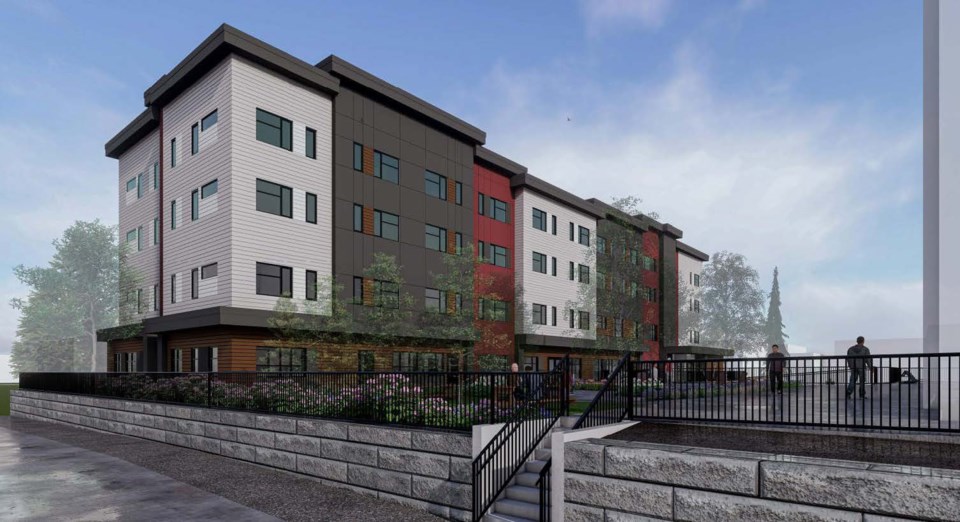The province has updated the community with information about 100 new residential units for people facing homelessness and other issues in Prince George.
They include the second phase of a three-phase project on 1st Avenue and 140/150 Ontario St., next to the first phase built at 160 Ontario St. Combining residences with health-care services, the building will include 41 supportive apartments, 10 complex-care housing (CCH) units and a ground-floor health clinic.
Construction began in July. The building, a partnership between the province, the City of Prince George and Northern Health, is expected to be ready for occupancy in 2026.
The City of Prince George provided the land for the project.
“These new supportive homes and complex-care units represent a significant step forward in addressing homelessness and providing critical care for those with complex needs,” stated Mayor Simon Yu in a press release from the province. “We are pleased to see the next phase of the 1st Avenue project beginning and we are also glad to see BC Housing purchasing more property in the area to deliver more homes to those in need.”
Connective, which operates the existing 50-unit supportive housing project at 160 Ontario St., will manage the new building as well. Northern Health will provide health services to the complex-care units, designed for people with complex health, mental-health and/or addiction issues, and operate the 9,000-square-foot health clinic.
"Over the past two years, Connective has been honored to provide supportive homes for 50 people at 160 Ontario St. We look forward to expanding this project and meeting the needs of an additional 41 community members experiencing homelessness,” stated Connective CEO Mark Miller, CEO. “Having already seen the benefits of complex-care housing at the current location, we are eager to continue working alongside our partners at Northern Health on the 10 additional units of housing, with supports for this vulnerable population."
Also updated Wednesday were the plans for what used to be the Hardwood Place Apartments at 1575 Queensway Ave. BC Housing bought the property and will turn it into 40 new units for homeless young people. Renovations on what will be called Reconnect Youth Village will begin in the fall.
With occupancy expected in spring 2025, the building will have 40 supportive homes for youth ages 14-18 and young people aging out of care, up to age 27, in studio, one- and two-bedroom apartments.
The existing 16-bed Reconnect Youth Village supportive-housing program funded by the Ministry of Children and Family Development will move to the site from its downtown location once renovations are completed.
BC Housing provided $12.7 million to buy and renovate the building through the Supportive Housing Fund.
The Prince George Native Friendship Centre will manage the building, with eight support staff on-site around the clock.
"The Reconnect Youth Village will nurture the spirit and strength of our youth, honouring their culture and heritage, and guiding them toward a future where they can thrive with pride and purpose,” stated Barb Ward Burkitt, executive director of the Prince George Native Friendship Centre.
“Youth, families, staff and community will come together in the spirit of knowledge sharing, friendship and kinship leading to the safety and wellness of young people living in and around Prince George."
The province has also bought a vacant property at 3177 McGill Cres., off Domano Boulevard, and plans to build 10 CCH units in partnership with Northern Health and Community Living BC. This project is in the preliminary stages, with no timelines yet set.
The operator will be selected through a competitive request-for-proposal process.
"Supportive housing for those struggling with homelessness or those with complex-care needs is a critical aspect of healing and recovery,” stated Northern Health board chair Colleen Nyce. “We are proud to be a partner in this work, which will make a real difference in the lives of those living in Prince George."
The province aims to spend $19 billion on supportive housing, with 80,000 homes built or underway. This includes more than 680 in Prince George.
"We know that when people experiencing homelessness have stable housing with supports, they can start to rebuild healthier lives," stated Ravi Kahlon, minister of housing. "People with complex health issues overlapping with housing insecurity challenges are often caught up in a cycle of homelessness. These new homes, along with access to appropriate supports, will help enable them to move out of that cycle and re-establish stability in their lives."



